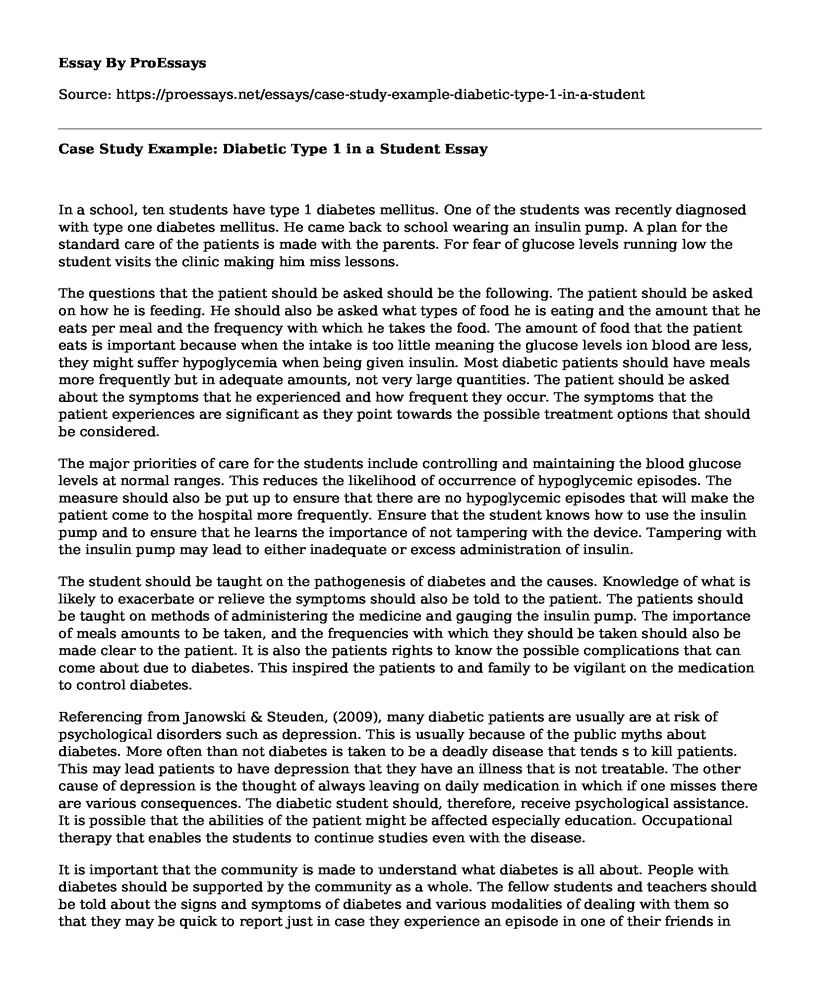In a school, ten students have type 1 diabetes mellitus. One of the students was recently diagnosed with type one diabetes mellitus. He came back to school wearing an insulin pump. A plan for the standard care of the patients is made with the parents. For fear of glucose levels running low the student visits the clinic making him miss lessons.
The questions that the patient should be asked should be the following. The patient should be asked on how he is feeding. He should also be asked what types of food he is eating and the amount that he eats per meal and the frequency with which he takes the food. The amount of food that the patient eats is important because when the intake is too little meaning the glucose levels ion blood are less, they might suffer hypoglycemia when being given insulin. Most diabetic patients should have meals more frequently but in adequate amounts, not very large quantities. The patient should be asked about the symptoms that he experienced and how frequent they occur. The symptoms that the patient experiences are significant as they point towards the possible treatment options that should be considered.
The major priorities of care for the students include controlling and maintaining the blood glucose levels at normal ranges. This reduces the likelihood of occurrence of hypoglycemic episodes. The measure should also be put up to ensure that there are no hypoglycemic episodes that will make the patient come to the hospital more frequently. Ensure that the student knows how to use the insulin pump and to ensure that he learns the importance of not tampering with the device. Tampering with the insulin pump may lead to either inadequate or excess administration of insulin.
The student should be taught on the pathogenesis of diabetes and the causes. Knowledge of what is likely to exacerbate or relieve the symptoms should also be told to the patient. The patients should be taught on methods of administering the medicine and gauging the insulin pump. The importance of meals amounts to be taken, and the frequencies with which they should be taken should also be made clear to the patient. It is also the patients rights to know the possible complications that can come about due to diabetes. This inspired the patients to and family to be vigilant on the medication to control diabetes.
Referencing from Janowski & Steuden, (2009), many diabetic patients are usually are at risk of psychological disorders such as depression. This is usually because of the public myths about diabetes. More often than not diabetes is taken to be a deadly disease that tends s to kill patients. This may lead patients to have depression that they have an illness that is not treatable. The other cause of depression is the thought of always leaving on daily medication in which if one misses there are various consequences. The diabetic student should, therefore, receive psychological assistance. It is possible that the abilities of the patient might be affected especially education. Occupational therapy that enables the students to continue studies even with the disease.
It is important that the community is made to understand what diabetes is all about. People with diabetes should be supported by the community as a whole. The fellow students and teachers should be told about the signs and symptoms of diabetes and various modalities of dealing with them so that they may be quick to report just in case they experience an episode in one of their friends in school.
References
Janowski, K., & Steuden, S. (2009). Psychological Aspects of Diabetes in Children and Adolescents. In E. Glab, Biopsychosocial aspects of health and disease. Vol. 2 (Vol. 2, pp. 17-24). Lublin: Centrum Psychoedukacji i Pomocy Psychologicznej.
Cite this page
Case Study Example: Diabetic Type 1 in a Student. (2021, Jun 25). Retrieved from https://proessays.net/essays/case-study-example-diabetic-type-1-in-a-student
If you are the original author of this essay and no longer wish to have it published on the ProEssays website, please click below to request its removal:
- HR Management Essay Example: Coaching Model for a Low-Performing Nurse
- The Princess and the Pea by Andersen Essay Example
- Emotional Dysregulation - Essay Sample
- Overcoming Fear of Public Speaking: My Story - Essay Sample
- Essay on Predictive Analytics: Revolutionizing Healthcare with Accurate Diagnostics
- Essay Sample on COVID-19 Pandemic: Causes, Clinical Presentations & Impact
- Covid-19: HR Challenges in Business Productivity Amidst Job Losses - Essay Sample







